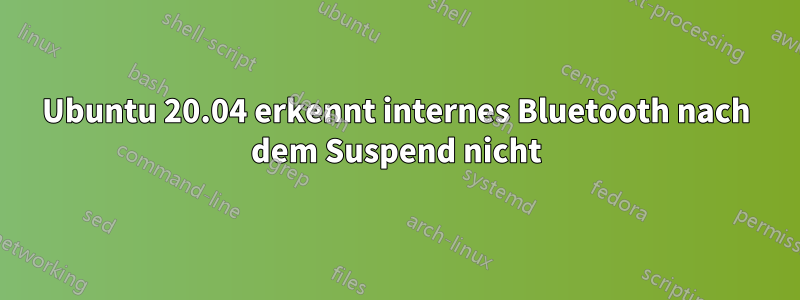
Ich habe ein ASUS mit Ubuntu 20.04 LTS. Ich habe festgestellt, dass mein Bluetooth nach einem Suspend meines Computers nicht funktioniert. Die einzige Lösung, die ich gefunden habe, ist, den Computer neu zu starten. Ich habe die Lösung für dieses Problem ausprobiertBluetooth funktioniert nach der Wiederaufnahme aus dem Ruhezustand Ubuntu 18.04 nicht, aber es funktioniert nicht. Ich habe bereits eine bessere Version von Bluez 5.53-0ubuntu3.1als die, die das Problem hat. Mein Problem hängt damit zusammenFrage, aber keiner hat geantwortet.
Ich bin für jede Hilfe wirklich dankbar, da ich von einem entfernten Standort aus arbeite und ständig ein Headset benötige.
Vielen Dank für Ihre Zeit.
Terminalausgabe vor dem Suspend
$ rfkill list
0: phy0: Wireless LAN
Soft blocked: yes
Hard blocked: no
1: hci0: Bluetooth
Soft blocked: no
Hard blocked: no
$ lsusb
Bus 002 Device 001: ID 1d6b:0003 Linux Foundation 3.0 root hub
Bus 001 Device 005: ID 04ca:3010 Lite-On Technology Corp.
Bus 001 Device 003: ID 04f2:b483 Chicony Electronics Co., Ltd USB2.0 VGA UVC WebCam
Bus 001 Device 002: ID 062a:4101 MosArt Semiconductor Corp. Wireless Keyboard/Mouse
Bus 001 Device 001: ID 1d6b:0002 Linux Foundation 2.0 root hub
$ sudo dmesg | grep -i blue
[ 3.770780] Bluetooth: Core ver 2.22
[ 3.770816] Bluetooth: HCI device and connection manager initialized
[ 3.770820] Bluetooth: HCI socket layer initialized
[ 3.770822] Bluetooth: L2CAP socket layer initialized
[ 3.770826] Bluetooth: SCO socket layer initialized
[ 7.634896] Bluetooth: BNEP (Ethernet Emulation) ver 1.3
[ 7.634898] Bluetooth: BNEP filters: protocol multicast
[ 7.634901] Bluetooth: BNEP socket layer initialized
[ 17.691202] Bluetooth: RFCOMM TTY layer initialized
[ 17.691210] Bluetooth: RFCOMM socket layer initialized
[ 17.691216] Bluetooth: RFCOMM ver 1.11
Terminalausgabe nach Suspend
$ rfkill list
0: phy0: Wireless LAN
Soft blocked: no
Hard blocked: no
$ lsusb
Bus 002 Device 001: ID 1d6b:0003 Linux Foundation 3.0 root hub
Bus 001 Device 006: ID 04ca:3010 Lite-On Technology Corp.
Bus 001 Device 003: ID 04f2:b483 Chicony Electronics Co., Ltd USB2.0 VGA UVC WebCam
Bus 001 Device 002: ID 062a:4101 MosArt Semiconductor Corp. Wireless Keyboard/Mouse
Bus 001 Device 001: ID 1d6b:0002 Linux Foundation 2.0 root hub
$ sudo dmesg | grep -i blue
[ 3.738454] Bluetooth: Core ver 2.22
[ 3.738472] Bluetooth: HCI device and connection manager initialized
[ 3.738475] Bluetooth: HCI socket layer initialized
[ 3.738477] Bluetooth: L2CAP socket layer initialized
[ 3.738479] Bluetooth: SCO socket layer initialized
[ 9.483031] Bluetooth: BNEP (Ethernet Emulation) ver 1.3
[ 9.483032] Bluetooth: BNEP filters: protocol multicast
[ 9.483035] Bluetooth: BNEP socket layer initialized
[ 19.747496] Bluetooth: RFCOMM TTY layer initialized
[ 19.747504] Bluetooth: RFCOMM socket layer initialized
[ 19.747510] Bluetooth: RFCOMM ver 1.11
[10365.247046] Bluetooth: Can't get version to change to load ram patch err
[10365.247050] Bluetooth: Loading patch file failed
Antwort1
Ich habe heute Nachmittag einige Tests zu diesem Thema durchgeführt und vermute, dass Ubuntu Bluetooth irgendwie nicht richtig geschlossen hat.
Versucht, Folgendes zu ändern: /etc/bluetooth/input.conf, unkommentiert:
Leerlaufzeitüberschreitung = 5
UserspaceHD=true
Und bisher habe ich es mit meinem JBL GO 3 getestet und was auch immer ich tue, der JBL stellt erneut eine Verbindung her.
Möglicherweise sind noch weitere Tests erforderlich. Ich werde versuchen, Sie darüber zu informieren :)


